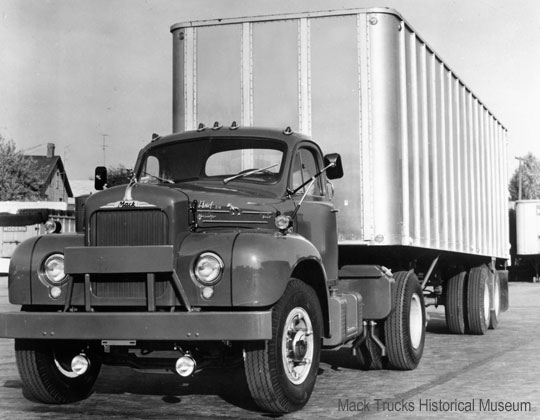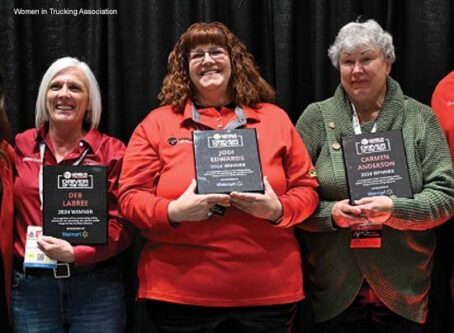Charlie B. leaves the trucking business

It wouldn’t be easy, but Charlie B. knew how to get out of the trucking business. First, he had to get in.
That was easy. All Charlie had to do was buy an old 1953 B Model Mack tractor for $5,000 and sign up for regional hauls with a cartage company at nearby Port Newark. He could pick up a container sometime after 6 p.m., drive less than an hour, drop the container, and then return. He could be in bed by 11 p.m. or midnight at the latest. Best of all, he was driving a truck. Charlie liked that. It was the perfect part-time job.
Well, maybe not perfect.
Actually, far from perfect – about as far as you can get.
Charlie’s full-time job was with a company that coated water, gas, and sewage pipe with gooey tar-like substances to protect it after it was put in service underground. In smelly, open sheds, they wrapped the sticky, tarred pipe in heavy paper with their name on it – Pipe Protection Service.
I worked in the office there in 1967. The company occupied a few acres in what’s now called The Meadowlands. In 1967, it was still just the Jersey meadows. Rimmed by industry, it was a dumping ground. Put a forklift blade through a drum? Toxic goo spilling out in the yard? No problem. Just roll the drum into the reeds and forget it.
The meadows burned frequently and ferociously.
Steel haulers – all owner-operators – brought in new steel pipe from Pennsylvania mills. After being coated and wrapped, the pipe left on a variety of trucks. One belonged to Lester Fellows Co., a long-time contract carrier for South Jersey Gas Co. They always sent the same driver, an old guy whose name I can’t recall. I do remember how he climbed over 40-foot lengths of coated pipe on his trailer like a mountain goat and strapped them down with expert agility.
He always said you had to be extra careful with heavy pipe. If you stopped too short, the pipe would keep moving, right through the cab. That happened to a couple of drivers he knew, he said, adding, “May they rest in peace.” Charlie told me the Lester Fellows driver was 82 years old.
But back to our story, Charlie worked the yard, operating the cranes to load and unload trucks. He used other equipment to move pipe around the yard or carry it to and from the coating sheds. At his disposal, he had two backhoes, a bulldozer, and a big, outdoor forklift. This stuff would come in handy.
Charlie had a wife and two kids in Sussex County, N.J., near Port Jervis, where New Jersey, New York and Pennsylvania meet. It was two hours from Pipe Protection in Kearny. Charlie lived in Sussex County weekends. Otherwise, he slept in a shack at Pipe Protection in the meadows.
Charlie knew drivers who told him he could make money hauling containers at night from a cartage company at the port. Charlie finally decided to do it.
Charlie borrowed some money, bought the Mack, and signed on with the carrier.
Trouble started right away. Even though the containers were in the company’s yard, not the port itself, Charlie had to wait interminably to pick up a container. Then he had to pass an inspection before he could leave.
There was always a light out, a flat tire, or some other dumb thing to hold him for an hour or two. Sometimes he had to bribe his way out. At the destination, he often had to wait for a container to return. Turned out midnight was the earliest he ever got back at his shack in the meadows.
With so little sleep, Charlie could only drive two nights a week, maybe three. Sometimes there were no loads on a night he was available to work. Charlie found himself working just to pay for fuel, insurance, and the bank loan for the truck. Breakdown followed blowout, and Charlie realized he had made a mistake – a big mistake.
As I said, getting in was easy. Getting out was trickier. Charlie couldn’t just quit. He still owed the bank, and he couldn’t sell the truck for anything like the $5,000 he had paid. The best offer he got was $2,500. He couldn’t pay off the loan from his full-time pay. He made just enough to support his family as it was. Charlie didn’t know what to do.
Then he had an inspiration, or maybe one of Charlie’s driver friends suggested it. Charlie had around-the-clock access to Pipe Protection’s large tract in the meadows as well as to its equipment.
One night, Charlie dug a big hole in the meadows at the far end of the property, drove the old Mack in, and buried it.
The next day, Charlie called and booked a load with the cartage company. Then he had a friend drop him behind a Jersey City diner on U.S. Route 1, a popular spot for truckers. He sat at the counter and ordered beef goulash with mashed potatoes and peas followed by coffee and a slice of lemon meringue pie.
After paying the check and leaving a generous tip, he walked out the door and around back where the trucks parked. He counted slowly to one hundred, then strode back into the diner and announced for everyone to hear, “Someone stole my truck!”
The insurance company had to be suspicious, but they paid. Charlie was out from under the loan and out of the owner-operator business.
How did I find out about Charlie’s caper? He told me. He was so pleased with himself he told everybody. Good thing everybody liked him. Someone would have tipped the insurance company otherwise. But that didn’t happen. Charlie got away with it.
Here’s more from Land Line’s John Bendel:
- Jersey Jim starts a trucking business.
- Jersey Jim starts a trucking business, Part 2.
- A hitchhiker remembers: No ‘black dog’ but a ‘woman in white.’









